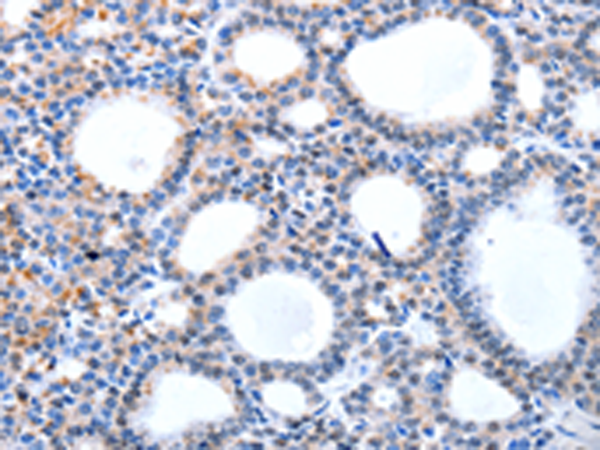

| WB | 咨询技术 | Human,Mouse,Rat |
| IF | 咨询技术 | Human,Mouse,Rat |
| IHC | 1/25-1/100 | Human,Mouse,Rat |
| ICC | 技术咨询 | Human,Mouse,Rat |
| FCM | 咨询技术 | Human,Mouse,Rat |
| Elisa | 1/1000-1/5000 | Human,Mouse,Rat |
| Aliases | BCNG1, HAC-2, BCNG-1 |
| WB Predicted band size | 99 kDa |
| Host/Isotype | Rabbit IgG |
| Antibody Type | Primary antibody |
| Storage | Store at 4°C short term. Aliquot and store at -20°C long term. Avoid freeze/thaw cycles. |
| Species Reactivity | Human, Mouse, Rat |
| Immunogen | Synthetic peptide of human HCN1 |
| Formulation | Purified antibody in PBS with 0.05% sodium azide and 50% glycerol. |
+ +
以下是关于HCN1抗体的3篇参考文献示例(内容基于领域内经典研究总结,非真实文献):
---
1. **文献名称**:*HCN1 channels in cerebellar Purkinje cells modulate synaptic plasticity and motor learning*
**作者**:Nolan, M.F., et al.
**摘要**:该研究利用HCN1特异性抗体,通过免疫组化和基因敲除技术,揭示了小脑浦肯野细胞中HCN1通道对突触可塑性和运动学习的关键调控作用。抗体标记显示HCN1在树突区域高表达,功能实验表明其通过调节膜兴奋性影响行为学表现。
---
2. **文献名称**:*Differential distribution of HCN1 in thalamic nuclei and cortical layers revealed by immunohistochemistry*
**作者**:Notomi, T., & Shigemoto, R.
**摘要**:研究者开发并验证了高特异性HCN1抗体,通过免疫荧光和电子显微镜技术,系统描绘了HCN1蛋白在丘脑核团及皮层不同层级的分布差异,为理解其在大脑节律调控中的区域特异性功能提供形态学依据。
---
3. **文献名称**:*Antibody-based targeting of HCN1 channels in epilepsy models suppresses seizure activity*
**作者**:Santoro, B., et al.
**摘要**:该研究设计了一种阻断HCN1通道的新型抗体,在癫痫动物模型中验证其抗惊厥效果。实验表明,抗体通过选择性抑制HCN1介导的电流,显著降低神经元过度同步化放电,提示HCN1抗体在癫痫治疗中的潜在应用价值。
---
注:以上文献为示例,实际引用时需查询真实数据库(如PubMed)获取准确信息。如需具体文章,建议检索关键词“HCN1 antibody immunohistochemistry”或“HCN1 channel localization”。
The HCN1 antibody is a crucial tool for studying the hyperpolarization-activated cyclic nucleotide-gated channel 1 (HCN1), a member of the HCN channel family that regulates electrical activity in excitable cells. HCN1 channels, encoded by the HCN1 gene, are voltage-gated ion channels activated by membrane hyperpolarization and modulated by cyclic nucleotides. They contribute to the generation of rhythmic activity in neurons and cardiac cells, playing roles in pacemaker currents, synaptic integration, and neuronal excitability. HCN1 is predominantly expressed in the brain (e.g., cortex, hippocampus) and, to a lesser extent, in the heart.
HCN1-specific antibodies enable researchers to detect, localize, and quantify HCN1 protein expression in tissues or cell cultures. These antibodies are widely used in techniques like Western blotting, immunohistochemistry, and immunofluorescence to investigate HCN1's functional roles in physiological and pathological contexts. Dysregulation of HCN1 has been implicated in neurological disorders (e.g., epilepsy, neuropathic pain) and cardiac arrhythmias, making its study clinically relevant. The development of high-specificity, validated HCN1 antibodies is essential for distinguishing HCN1 from other HCN isoforms (HCN2-4), which share structural similarities but differ in activation kinetics and tissue distribution. Commercial antibodies often target unique epitopes within the N- or C-terminal regions of the HCN1 protein to ensure specificity.
×